3 citations,
February 2018 in “Experimental and Molecular Medicine/Experimental and molecular medicine” A protein called PCBP2 controls the production of a hair growth protein by interacting with its genetic message and is linked to hair loss when this control is disrupted.
[object Object] 2 citations,
May 2022 in “Stem cell research & therapy” Disrupted stem cell signals in hairpoor mice cause hair loss.
 1 citations,
August 2012 in “Journal der Deutschen Dermatologischen Gesellschaft”
1 citations,
August 2012 in “Journal der Deutschen Dermatologischen Gesellschaft” A woman's hyperandrogenism was caused by a genetic mutation leading to non-classic adrenogenital syndrome.
 May 2024 in “Animal genetics”
May 2024 in “Animal genetics” A cat's poor wound healing was linked to a genetic deletion in the COL5A1 gene.
May 2018 in “The journal of immunology/The Journal of immunology” Mutations in the FOXN1 gene cause severe immune issues but don't affect hair and nails.
5 citations,
May 2014 in “Clinical and Experimental Dermatology” Mutations in the desmoplakin gene can cause hair problems and deadly heart disease.
 March 2023 in “JAAD case reports”
March 2023 in “JAAD case reports” A new genetic change in the keratin 10 gene caused a skin condition called ichthyosis hystrix in a father and his daughter.
May 2017 in “The journal of immunology/The Journal of immunology” Patients with certain FoxN1 gene mutations have severe immune issues but normal skin and hair.
 June 2021 in “Dermatology Online Journal”
June 2021 in “Dermatology Online Journal” A girl with a rare genetic condition affecting hair and nails also developed a common type of hair loss, suggesting a possible genetic link.
April 2019 in “Journal of the Endocrine Society” A young patient with unusual insulin resistance and high testosterone levels had a rare INSR gene mutation.
 January 2024 in “Genetics in Medicine Open”
January 2024 in “Genetics in Medicine Open” A new IL6ST gene variant may cause a unique form of hyper-IgE syndrome with skin abscesses and high IgE levels.
 February 2023 in “Journal of dermatology”
February 2023 in “Journal of dermatology” The first Japanese case of a genetic hair disorder caused by specific mutations in the LIPH gene was identified.
3 citations,
January 2013 in “Dermatology” New genetic mutations causing hair loss were found in a Chinese family.
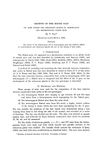 2 citations,
January 1960 in “Australian Journal of Biological Sciences”
2 citations,
January 1960 in “Australian Journal of Biological Sciences” The Naked gene in mice causes abnormal sebaceous glands and disrupts hair follicle organization.
 9 citations,
February 2013 in “Hormone and Metabolic Research”
9 citations,
February 2013 in “Hormone and Metabolic Research” Mutations in the CYP21A2 gene are not a major factor in causing PCOS.
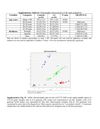 7 citations,
July 2020 in “Immunological Investigations”
7 citations,
July 2020 in “Immunological Investigations” The rs231775 genetic variant is linked to a higher risk and severity of Alopecia Areata in males.
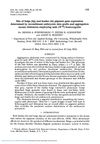 7 citations,
October 1985 in “Genetics Research”
7 citations,
October 1985 in “Genetics Research” Beige and leaden pigment genes act within melanocytes, affecting pigment patterns.
 6 citations,
November 2019 in “The application of clinical genetics”
6 citations,
November 2019 in “The application of clinical genetics” The study found that a specific genetic variation in the TNFα gene is significantly linked to Alopecia Areata in the Jordanian Arab population.
 1 citations,
January 2022 in “Research Square (Research Square)”
1 citations,
January 2022 in “Research Square (Research Square)” CRISPR/Cas9 editing in spinach affects root hair growth by altering specific genes.
March 2021 in “Medico-Legal Update” The androgen receptor gene doesn't affect women with recurrent spontaneous abortions, but having a mutant genotype might protect against it.
 October 2022 in “Journal for Research in Applied Sciences and Biotechnology”
October 2022 in “Journal for Research in Applied Sciences and Biotechnology” Certain changes in the SHBG gene may increase the risk of PCOS in Iraqi women.
12 citations,
March 2012 in “JEADV. Journal of the European Academy of Dermatology and Venereology/Journal of the European Academy of Dermatology and Venereology” A specific gene mutation in Japanese people can cause varying degrees of hair thinning in adulthood.
 10 citations,
March 2015 in “Journal of dermatology”
10 citations,
March 2015 in “Journal of dermatology” The boy's severe skin disorder is caused by two new mutations in his TGM1 gene.
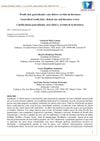 July 2024 in “Journal Archives of Health”
July 2024 in “Journal Archives of Health” Woolly hair is a rare genetic condition with no effective treatments.
 June 2010 in “Melanoma research”
June 2010 in “Melanoma research” LDE225 is a promising skin-applied treatment for basal cell carcinoma with good skin penetration and effectiveness.
 19 citations,
November 1993 in “Mammalian Genome”
19 citations,
November 1993 in “Mammalian Genome” A gene mutation in mice causes permanent hair loss and skin issues.

A TNFAIP3 gene mutation can cause unusual and varied symptoms of lupus and Sjogren's syndrome.
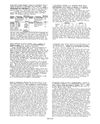 April 1974 in “Pediatric Research”
April 1974 in “Pediatric Research” The Naked (N) trait in mice is linked to lower glycine and tyrosine in hair proteins.
[object Object] 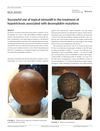 1 citations,
August 2019 in “Pediatric dermatology”
1 citations,
August 2019 in “Pediatric dermatology” Topical minoxidil helped an 8-year-old boy with a genetic hair disorder grow hair.
15 citations,
June 2019 in “Biochemical Journal” A new genetic disorder caused by an ODC1 mutation can be treated with DFMO.



















